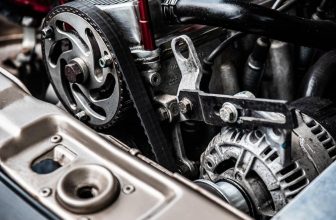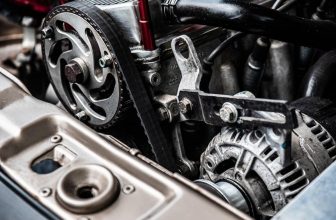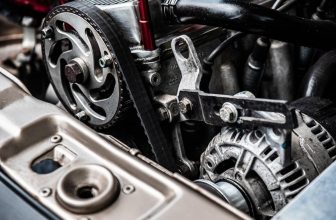
Do you ever wonder why recycling old car parts can actually earn you money? Well, it's no coincidence. In fact, there is a thriving market for salvaged auto components that are in high demand. By recycling these parts, not only are you reducing manufacturing costs, but you are also contributing to a more sustainable future. In this article, we will delve into the reasons why recycling old car parts can be a profitable endeavor. So, let's explore the world of reconditioned parts and the profit potential they hold.
Key Takeaways
- Recycling old car parts earns money because it reduces energy consumption and greenhouse gas emissions.
- It also minimizes waste in landfills and decreases the need for new manufacturing processes.
- Recycling old car parts contributes to a more sustainable future and helps protect the environment.
- Additionally, selling reconditioned parts is a cost-effective alternative to new parts and aligns with growing market trends towards sustainable practices.
The Value of Salvaged Car Parts
When you recycle old car parts, you can earn money because of the value they retain when salvaged. Salvaging car parts not only has a positive environmental impact but also offers several benefits when used in repairs. First, let's consider the environmental impact. Recycling car parts reduces the need for new manufacturing processes, which in turn decreases energy consumption and greenhouse gas emissions. By reusing components, we can also minimize the amount of waste that ends up in landfills. Now, let's explore the benefits of using recycled auto components in repairs. One significant advantage is cost savings. Salvaged parts are often significantly cheaper than new ones, making repairs more affordable for vehicle owners. Additionally, using recycled parts reduces the demand for new production, which further conserves resources and reduces pollution associated with manufacturing. Furthermore, salvaged parts are often just as reliable and perform just as well as new ones, making them a viable option for repairs. In conclusion, recycling old car parts not only helps protect the environment but also allows you to earn money by capitalizing on their retained value.
The Demand for Used Auto Components
To understand why recycling old car parts earns money, it's important to recognize the high demand for used auto components. Market trends in used auto components show a growing preference for recycled parts due to their cost-effectiveness and environmental benefits.
Firstly, the market for used auto components has expanded significantly in recent years. As vehicles become more complex and expensive to repair, consumers are increasingly turning to recycled parts as a more affordable alternative. This has led to a rise in demand for used components, creating a lucrative market for recyclers and salvagers.
Secondly, using recycled car parts has clear environmental benefits. Manufacturing new auto parts requires significant amounts of energy and raw materials, contributing to pollution and resource depletion. By recycling old car parts, we can reduce the need for new production and conserve resources. Additionally, recycling helps to reduce the amount of waste sent to landfills, minimizing the environmental impact of the automotive industry.
How Recycling Reduces Manufacturing Costs
Recycling old car parts reduces manufacturing costs by utilizing existing materials and components. This practice not only contributes to a reduced environmental impact but also brings several benefits to the local economy. Here are three key ways recycling helps in reducing manufacturing costs:
- Lower raw material costs: By reusing old car parts, manufacturers can avoid the need to purchase new raw materials. This significantly reduces the expenses associated with sourcing and processing new materials, leading to substantial cost savings.
- Reduced energy consumption: Manufacturing new car parts from scratch requires a considerable amount of energy. However, recycling old car parts minimizes the need for energy-intensive processes like mining, refining, and manufacturing. As a result, manufacturers can save on energy costs, leading to reduced manufacturing expenses.
- Decreased waste disposal costs: Recycling old car parts prevents them from ending up in landfills, which can be costly for manufacturers. By repurposing these parts, manufacturers can avoid waste disposal fees and reduce their overall waste management expenses.
The Role of Scrap Yards in the Market
After reducing manufacturing costs through recycling, it is important to understand the role of scrap yards in the market. Scrap yards play a crucial role in the recycling industry by serving as collection centers for various types of scrap metal. They act as intermediaries between consumers and recycling facilities, facilitating the movement of recyclable materials and ensuring their proper disposal or repurposing.
One of the key factors that determine the role of scrap yards in the market is the fluctuation of scrap metal prices. As the demand for certain types of scrap metal increases, the prices offered by scrap yards rise, incentivizing individuals and businesses to recycle their old car parts and other scrap metal. Conversely, when the demand decreases, prices drop, making it less profitable for scrap yards to accept certain types of scrap metal.
To illustrate the role of scrap yards in the market, consider the following table:
| Scrap Metal Type | Current Scrap Yard Price (per pound) |
|---|---|
| Steel | $0.15 |
| Aluminum | $0.50 |
| Copper | $2.50 |
| Brass | $1.25 |
| Stainless Steel | $0.75 |
Profit Potential in Selling Reconditioned Parts
Once you've recycled your old car parts at a scrap yard, you can tap into the profit potential by selling reconditioned parts. Reconditioning involves restoring used parts to their original working condition, increasing their value and marketability. Here are three reasons why selling reconditioned car parts can be a profitable business venture:
- High demand: The market for reconditioned car parts is growing rapidly due to the increasing popularity of car repairs and maintenance. Many car owners prefer reconditioned parts as a cost-effective alternative to buying new ones. This high demand creates a profitable opportunity for those in the reconditioned parts business.
- Lower costs: Reconditioning old car parts is often more cost-effective than manufacturing new ones. By recycling and refurbishing existing parts, you can significantly reduce production costs. This allows for higher profit margins when selling reconditioned parts.
- Market trends: The automotive industry is experiencing a shift towards sustainable practices, including the use of recycled and reconditioned parts. As more consumers prioritize environmental responsibility, the demand for reconditioned parts is expected to continue growing. By aligning your business with these market trends, you can position yourself for long-term profitability.
Frequently Asked Questions
What Are Some Common Types of Salvaged Car Parts That Can Be Recycled for Money?
To earn money recycling salvaged car parts, you can focus on profitable options like engines, transmissions, and body panels. These popular recycled car parts can be in high demand and fetch a good price in the market.
How Does the Recycling of Old Car Parts Contribute to Environmental Sustainability?
Recycling old car parts contributes to environmental sustainability by reducing waste and conserving resources. It also has economic benefits, as the materials can be repurposed and sold, creating a market for recycled car parts.
Are There Any Specific Regulations or Guidelines That Govern the Recycling of Car Parts?
Regulations and guidelines play a crucial role in the recycling of car parts within the automotive industry. Recycling laws ensure proper disposal, reduce waste, and encourage the reuse of materials, thus contributing to environmental sustainability.
Can Individuals With Minimal Automotive Knowledge Participate in Recycling Old Car Parts for Profit?
Opportunities for non-experts in recycling old car parts for profit exist. With minimal automotive knowledge, you can navigate the market, identify valuable parts, and sell them to buyers seeking affordable alternatives. Potential profitability awaits.
What Are Some Challenges or Obstacles That Individuals May Face When Getting Involved in the Recycling of Car Parts for Profit?
Challenges in recycling car parts for profit include sourcing quality parts, market competition, and logistical considerations. Profitability can be achieved by efficient operations, effective pricing strategies, and building a strong customer base.
Conclusion
So there you have it, my friend. Recycling old car parts is a little goldmine of profit potential. The value of salvaged components, the demand for used auto parts, and the cost-saving benefits for manufacturers all contribute to the lucrative nature of this industry. And let's not forget about the scrap yards, the unsung heroes of this market. So next time you come across an old car part, remember, you might just be holding a small fortune in your hands. Happy recycling!





